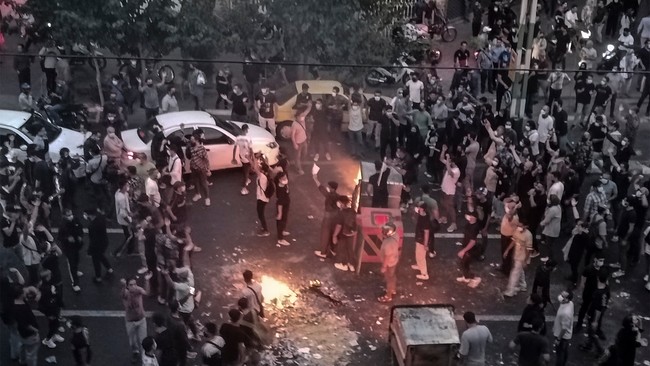
If this report from Reuters is accurate, the mullahs of Tehran have every reason to worry. Not just because Iranians know that Israel will eventually respond to the missile attack, and not because they fear the Israelis. They are sick of the mullahs, and now worry that the IRGC has pulled them into a war that will make their lives even more miserable than usual:
“Economic pressure will mount, our safety will be jeopardized … We must avoid conflict at all cost. I don’t want a war. How can I protect my two children? Nowhere will be safe.”
Housewife Parvaneh fears an Israeli strike could be the final hammer blow to the economy, weakened by years of sanctions, mismanagement and corruption.
“We Iranians have endured more than enough for years. War brings only disaster. My husband is a factory worker. We do not have even enough money to buy staples let alone stockpiling them,” said the 37-year-old mother-of-two in the central city of Yazd.
And this is what they say on the record, when the IRGC police state and mullahs are watching. Imagine what they say more privately.
Overall, the mood in Iran resembles that of the immediate post-revolution period or the start of the 1980 war with Iraq, Reuters reports further. That is reflected in a sudden thirst for hard foreign currency, a key indicator of a crisis in confidence in a government, in which the rial descended into microscopic depths. The official governmental exchange rate for the Iranian rial is 42,060 to one US dollar, but panic trading for hard currency pushed it to over 700,000 per dollar, CNBC reported on Sunday, a record low for worthlessness.
We do have a pretty good indication that the regime is worried about the mood of the country. Also Sunday, the IRGC declared a ban on any expression of support for Israel on social media platforms:
The intelligence unit of Iran’s Revolutionary Guard Corps issued a statement on Sunday warning against any pro-Israeli posts by Iranian social media users, state media reported.
Some Iranians, inside and outside the country, have voiced their support for Israel after Iran launched an overnight drone and missile attack in retaliation for Israel’s suspected bombing of its consulate in Syria’s capital on April 1.
That doesn’t sound as though the regime has much confidence in the support from its subjects. Declarations such as these will likely make that situation worse, in fact, as are the sudden moves by Western nations to pull their personnel and families out of Iran.
Will Israel strike to get the ball rolling — or simply wait to see how much longer the mullahs can keep the dissent bottled up? According to the Jerusalem Post, the unity government has decided on its response to the Iranian attack, but they’re going to let the mullahs stew for a while:
The IDF has decided how it will counter-strike Iran and its proxies but has not yet settled on the timing; multiple sources told The Jerusalem Post on Tuesday. …
IDF Chief of Staff Lt.-Gen. Herzi Halevi hinted that the timing of the attack was not very imminent during a visit to the Arrow air defense battery of Battalion 136.
He said, “We are enabling a home front policy to at least give citizens this Passover week to live almost like normal because we completely trust you and your readiness.”
It is also possible that Halevi, Home Front command policies, and other officials keeping their regular schedules are part of a clever fake-out to get Iran and its proxies to lower their guard. But at least the plain reading of the relevant signals suggests that a major attack is not imminent in the coming days and could even be postponed for longer.
The IDF took out three Hezbollah commanders today in targeted strikes as its response to Hezbollah attacks over the weekend, but that’s separate from the response to Iran.
At this point, perhaps sanctions might be most effective. If the US and the EU put together a set of sanctions that can strangle Iran’s ability to get income from its oil, for instance, that may set off an already restive and unhappy populace. But that would require Western nations to show some courage and deal with China’s unhappiness over oil restrictions, and thus far few if any of Israel’s allies seem willing to go that far.
The only real solution to the threats from Iran is regime change. After October 7 revealed the true nature of Iran’s proxy war against the West, we shouldn’t pursue any other policy goal in regard to Tehran.
